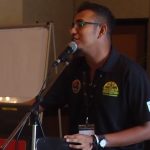According to Sabah Wildlife Department (SWD), Malaysia is one of the major producers of palm oil and Sabah produces 30% of Malaysian total palm oil output, planted on 1.4 million hectares land. 49% of Sabah is under permanent forest cover. In Sabah, key pressures on biodiversity are habitat loss, habitat fragmentation, habitat degradation, and climate change. Another pressure that many people often forgot is human population growth and in Sabah, the increase is tremendous which was at 390% from year 1970 until 2010. To address these pressures on biodiversity in Sabah, WRU was funded and established through Malaysian Palm Oil Wildlife Conservation Fund (MPOWCF).
The responsibilities of WRU include rescue and relocation, research, public awareness, reduce human-wildlife conflict (HWC) and enforcement. Until 2015, more than 175 Bornean Elephants, 35 Orang Utans, 33 Proboscis Monkeys, 1785 Macaques, 20 Sun Bears, 4 Clouded Leopards, 26 Sambar Deers, 60 Crocodiles, 25 Monitor Lizards, 16 Turtles, and 14 Marine Mammals were rescued or translocated by WRU. For the Bornean Elephant, WRU has been using the Bornean Elephant Sanctuary (BES) to rehabilitate rescued elephant. Other than the elephant, WRU was also very active in conservation of the Sumatran Rhinoceros.
WRU is also managing the Wildlife Rescue Centre (WRC) in Kg. Potuki, Lok Kawi. Together with the EcoHealth Alliance, WRU has established the Wildlife Health Unit (WHU) and its purpose is to identify and respond to any possible dangerous disease spread from wildlife to human. WRU is also operating a wildlife genetic forensic and health laboratory. This laboratory aims is to increase local capacity in zoonotic disease diagnostic. With all these tasks, it is important for all stakeholders to support WRU towards protecting and conserving biodiversity in Sabah.
This paper was presented at the “Biodiversity Forum 2016”, with the theme “Human-Wildlife Conflict Mitigation and Action in the Agricultural Sector” jointly organized by Malaysian Palm Oil Council (MPOC) with Department of Wildlife and National Parks, Peninsular Malaysia (PERHILITAN) in Awana Genting Resort on 23rd – 24th May 2016.
The Role Of The Malaysian Oil Palm Industry In Wildlife Conservation in Sabah The Wildlife Rescue Unit As A Case Study |
Reviewed by: Ahmad Shahdan Kasim


 Dr. Pakeeyaraj A/L Nagalingam,
Dr. Pakeeyaraj A/L Nagalingam, 